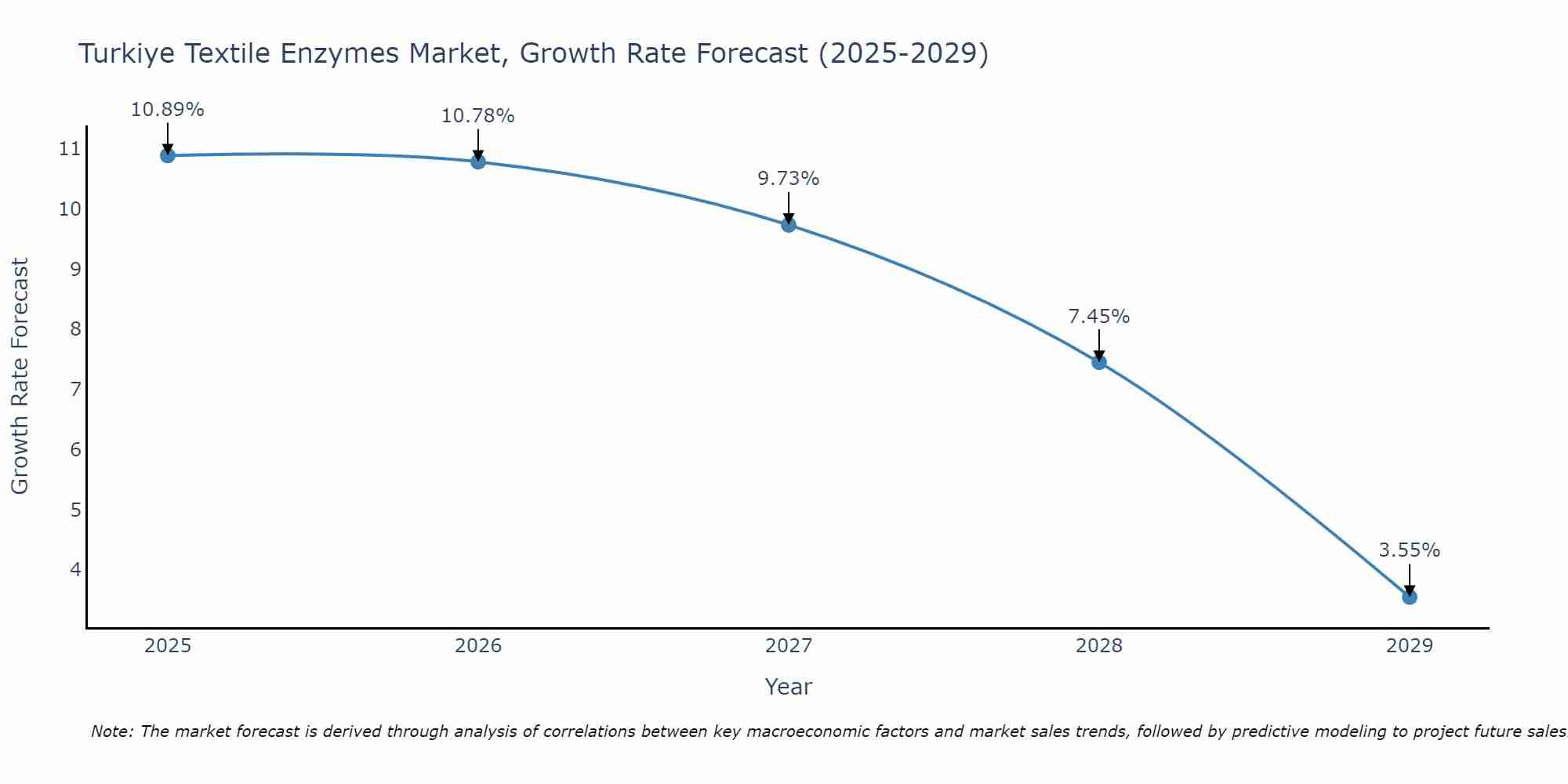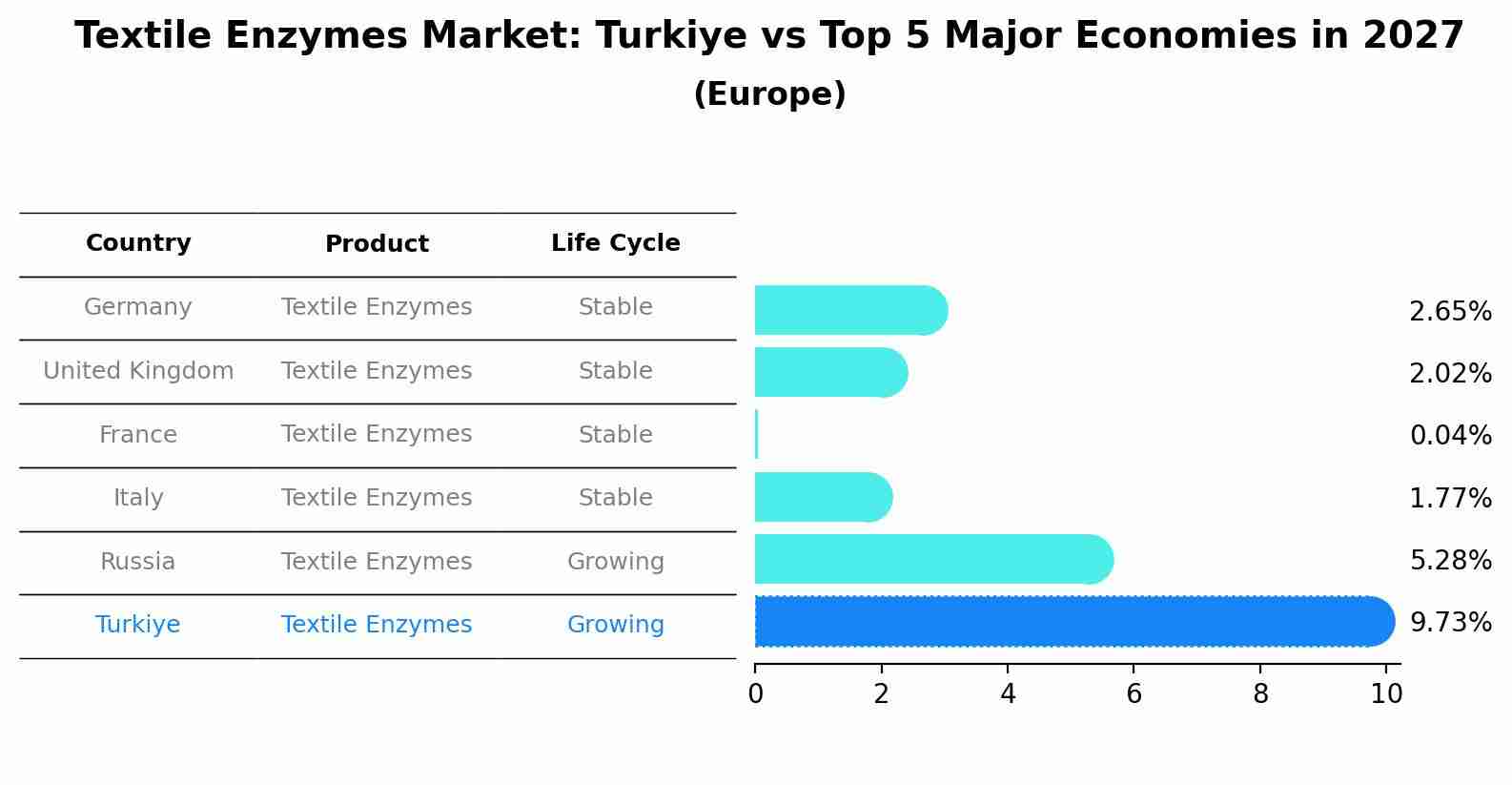Turkey Textile Enzymes Market Outlook | Growth, Analysis, Share, Industry, Forecast, Value, Trends, Companies, COVID-19 IMPACT, Size & Revenue
| Product Code: ETC094077 | Publication Date: Jun 2021 | Updated Date: Jun 2025 | Product Type: Report | |
| Publisher: 6Wresearch | Author: Shubham Padhi | No. of Pages: 70 | No. of Figures: 35 | No. of Tables: 5 |
Turkiye Textile Enzymes Market Size Growth Rate
The Turkiye Textile Enzymes Market could see a tapering of growth rates over 2025 to 2029. Starting high at 10.89% in 2025, the market steadily declines to 3.55% by 2029.

Textile Enzymes Market: Turkiye vs Top 5 Major Economies in 2027 (Europe)
The Textile Enzymes market in Turkiye is projected to grow at a growing growth rate of 9.73% by 2027, highlighting the country's increasing focus on advanced technologies within the Europe region, where Germany holds the dominant position, followed closely by United Kingdom, France, Italy and Russia, shaping overall regional demand.

Turkey Textile Enzymes Market Overview
The Turkey Textile Enzymes Market is experiencing steady growth driven by increasing demand for sustainable textile production processes and eco-friendly solutions. Enzymes are widely used in the textile industry for applications such as desizing, bio-polishing, and denim finishing, as they offer advantages like reduced energy consumption, water savings, and enhanced product quality. Key players in the market are focusing on developing innovative enzyme solutions to cater to the evolving needs of textile manufacturers seeking to improve production efficiency and reduce environmental impact. Rising awareness about the benefits of enzyme technology in textile processing, coupled with stringent regulations promoting sustainable practices, is expected to further drive the growth of the Turkey Textile Enzymes Market in the coming years.
Turkey Textile Enzymes Market Trends
The Turkey Textile Enzymes Market is experiencing a rise in demand for eco-friendly and sustainable enzymatic solutions in textile processing. Enzymes are being increasingly used for various applications such as bio-polishing, desizing, and denim finishing, as they offer several advantages including reduced water consumption, energy savings, and improved fabric quality. Manufacturers are focusing on developing innovative enzyme formulations that are more effective, cost-efficient, and environmentally friendly. Additionally, there is a growing awareness among consumers regarding the harmful effects of traditional chemical processes on the environment and human health, driving the adoption of enzymatic solutions in the textile industry. Overall, the Turkey Textile Enzymes Market is witnessing a shift towards greener and more sustainable practices to meet the evolving demands of the industry and consumers alike.
Turkey Textile Enzymes Market Challenges
In the Turkey Textile Enzymes Market, some key challenges include increasing competition from international enzyme manufacturers, fluctuating raw material prices, and the need for continuous innovation to meet evolving consumer demands. The market is also influenced by regulatory factors related to environmental sustainability and compliance with safety standards. Additionally, there is a growing emphasis on product differentiation and quality control, requiring companies to invest in research and development to stay ahead of the competition. Economic uncertainties and geopolitical factors can also impact the market dynamics, leading to fluctuations in demand and pricing. Overall, companies operating in the Turkey Textile Enzymes Market need to navigate these challenges effectively to sustain growth and profitability in a competitive environment.
Turkey Textile Enzymes Market Investment Opportunities
The Turkey Textile Enzymes Market presents promising investment opportunities due to the increasing demand for sustainable and eco-friendly textile processing solutions. Enzymes are being increasingly used in the textile industry for processes like desizing, bio-polishing, and denim finishing, as they offer improved efficiency and reduced environmental impact compared to traditional chemical methods. As the textile industry in Turkey continues to grow and focus on sustainability, the demand for textile enzymes is expected to rise. Investors can explore opportunities in enzyme manufacturers, distributors, or technology providers catering to this market segment. Additionally, investing in research and development of innovative enzyme solutions tailored to the specific needs of the Turkish textile industry can also be a lucrative venture in this growing market.
Turkey Textile Enzymes Market Government Policy
The Turkish government has implemented various policies to support the Textile Enzymes Market, aiming to enhance the competitiveness of the industry. These policies include providing financial incentives and subsidies to companies investing in research and development of enzyme technology, as well as supporting the adoption of environmentally friendly and sustainable practices within the textile sector. Additionally, there are regulations in place to ensure the safety and quality of enzyme products used in textiles, with strict monitoring and enforcement mechanisms to prevent any misuse or harmful effects on human health and the environment. Overall, the government`s initiatives are geared towards promoting innovation, sustainability, and responsible manufacturing practices in the Turkey Textile Enzymes Market.
Turkey Textile Enzymes Market Future Outlook
The Turkey Textile Enzymes Market is expected to witness steady growth in the coming years due to increasing demand for eco-friendly and sustainable textile processing solutions. Enzymes offer several benefits such as reduced water and energy consumption, improved fabric quality, and lower chemical usage, which align with the growing emphasis on sustainability in the textile industry. Additionally, advancements in enzyme technology, expanding applications in various textile processes such as desizing, bio-polishing, and denim finishing, and the rising adoption of enzymes by textile manufacturers to meet regulatory standards are further driving market growth. With the focus on sustainable practices and innovation in textile processing, the Turkey Textile Enzymes Market is poised for expansion and is likely to attract investments and new product developments in the foreseeable future.
Key Highlights of the Report:
- Turkey Textile Enzymes Market Outlook
- Market Size of Turkey Textile Enzymes Market, 2021
- Forecast of Turkey Textile Enzymes Market, 2027
- Historical Data and Forecast of Turkey Textile Enzymes Revenues & Volume for the Period 2018 - 2027
- Turkey Textile Enzymes Market Trend Evolution
- Turkey Textile Enzymes Market Drivers and Challenges
- Turkey Textile Enzymes Price Trends
- Turkey Textile Enzymes Porter's Five Forces
- Turkey Textile Enzymes Industry Life Cycle
- Historical Data and Forecast of Turkey Textile Enzymes Market Revenues & Volume By Type for the Period 2018 - 2027
- Historical Data and Forecast of Turkey Textile Enzymes Market Revenues & Volume By Cellulase for the Period 2018 - 2027
- Historical Data and Forecast of Turkey Textile Enzymes Market Revenues & Volume By Amylase for the Period 2018 - 2027
- Historical Data and Forecast of Turkey Textile Enzymes Market Revenues & Volume By Catalase for the Period 2018 - 2027
- Historical Data and Forecast of Turkey Textile Enzymes Market Revenues & Volume By Pectinase for the Period 2018 - 2027
- Historical Data and Forecast of Turkey Textile Enzymes Market Revenues & Volume By Laccase for the Period 2018 - 2027
- Historical Data and Forecast of Turkey Textile Enzymes Market Revenues & Volume By Others for the Period 2018 - 2027
- Historical Data and Forecast of Turkey Textile Enzymes Market Revenues & Volume By Application for the Period 2018 - 2027
- Historical Data and Forecast of Turkey Textile Enzymes Market Revenues & Volume By Bio-polishing for the Period 2018 - 2027
- Historical Data and Forecast of Turkey Textile Enzymes Market Revenues & Volume By Desizing for the Period 2018 - 2027
- Historical Data and Forecast of Turkey Textile Enzymes Market Revenues & Volume By Enzymatic Bleaching for the Period 2018 - 2027
- Historical Data and Forecast of Turkey Textile Enzymes Market Revenues & Volume By Bioscouring for the Period 2018 - 2027
- Historical Data and Forecast of Turkey Textile Enzymes Market Revenues & Volume By Others for the Period 2018 - 2027
- Turkey Textile Enzymes Import Export Trade Statistics
- Market Opportunity Assessment By Type
- Market Opportunity Assessment By Application
- Turkey Textile Enzymes Top Companies Market Share
- Turkey Textile Enzymes Competitive Benchmarking By Technical and Operational Parameters
- Turkey Textile Enzymes Company Profiles
- Turkey Textile Enzymes Key Strategic Recommendations
Frequently Asked Questions About the Market Study (FAQs):
- Single User License$ 1,995
- Department License$ 2,400
- Site License$ 3,120
- Global License$ 3,795
Search
Related Reports
- ASEAN Bearings Market (2025-2031) | Strategy, Consumer Insights, Analysis, Investment Trends, Opportunities, Growth, Size, Share, Industry, Revenue, Segments, Value, Segmentation, Supply, Forecast, Restraints, Outlook, Competition, Drivers, Trends, Demand, Pricing Analysis, Competitive, Strategic Insights, Companies, Challenges
- Europe Flooring Market (2025-2031) | Outlook, Share, Industry, Trends, Forecast, Companies, Revenue, Size, Analysis, Growth & Value
- Saudi Arabia Manlift Market (2025-2031) | Outlook, Size, Growth, Trends, Companies, Industry, Revenue, Value, Share, Forecast & Analysis
- Uganda Excavator, Crane, and Wheel Loaders Market (2025-2031) | Strategy, Consumer Insights, Analysis, Investment Trends, Opportunities, Growth, Size, Share, Industry, Revenue, Segments, Value, Segmentation, Supply, Forecast, Restraints, Outlook, Competition, Drivers, Trends, Demand, Pricing Analysis, Competitive, Strategic Insights, Companies, Challenges
- Rwanda Excavator, Crane, and Wheel Loaders Market (2025-2031) | Strategy, Consumer Insights, Analysis, Investment Trends, Opportunities, Growth, Size, Share, Industry, Revenue, Segments, Value, Segmentation, Supply, Forecast, Restraints, Outlook, Competition, Drivers, Trends, Demand, Pricing Analysis, Competitive, Strategic Insights, Companies, Challenges
- Kenya Excavator, Crane, and Wheel Loaders Market (2025-2031) | Strategy, Consumer Insights, Analysis, Investment Trends, Opportunities, Growth, Size, Share, Industry, Revenue, Segments, Value, Segmentation, Supply, Forecast, Restraints, Outlook, Competition, Drivers, Trends, Demand, Pricing Analysis, Competitive, Strategic Insights, Companies, Challenges
- Angola Excavator, Crane, and Wheel Loaders Market (2025-2031) | Strategy, Consumer Insights, Analysis, Investment Trends, Opportunities, Growth, Size, Share, Industry, Revenue, Segments, Value, Segmentation, Supply, Forecast, Restraints, Outlook, Competition, Drivers, Trends, Demand, Pricing Analysis, Competitive, Strategic Insights, Companies, Challenges
- Israel Intelligent Transport System Market (2025-2031) | Strategy, Consumer Insights, Analysis, Investment Trends, Opportunities, Growth, Size, Share, Industry, Revenue, Segments, Value, Segmentation, Supply, Forecast, Restraints, Outlook, Competition, Drivers, Trends, Demand, Pricing Analysis, Competitive, Strategic Insights, Companies, Challenges
- Uganda Precast and Aggregate Market (2025-2031) | Strategy, Consumer Insights, Analysis, Investment Trends, Opportunities, Growth, Size, Share, Industry, Revenue, Segments, Value, Segmentation, Supply, Forecast, Restraints, Outlook, Competition, Drivers, Trends, Demand, Pricing Analysis, Competitive, Strategic Insights, Companies, Challenges
- Australia IT Asset Disposal Market (2025-2031) | Strategy, Consumer Insights, Analysis, Investment Trends, Opportunities, Growth, Size, Share, Industry, Revenue, Segments, Value, Segmentation, Supply, Forecast, Restraints, Outlook, Competition, Drivers, Trends, Demand, Pricing Analysis, Competitive, Strategic Insights, Companies, Challenges
Industry Events and Analyst Meet
Our Clients
Whitepaper
- Middle East & Africa Commercial Security Market Click here to view more.
- Middle East & Africa Fire Safety Systems & Equipment Market Click here to view more.
- GCC Drone Market Click here to view more.
- Middle East Lighting Fixture Market Click here to view more.
- GCC Physical & Perimeter Security Market Click here to view more.
6WResearch In News
- Doha a strategic location for EV manufacturing hub: IPA Qatar
- Demand for luxury TVs surging in the GCC, says Samsung
- Empowering Growth: The Thriving Journey of Bangladesh’s Cable Industry
- Demand for luxury TVs surging in the GCC, says Samsung
- Video call with a traditional healer? Once unthinkable, it’s now common in South Africa
- Intelligent Buildings To Smooth GCC’s Path To Net Zero













